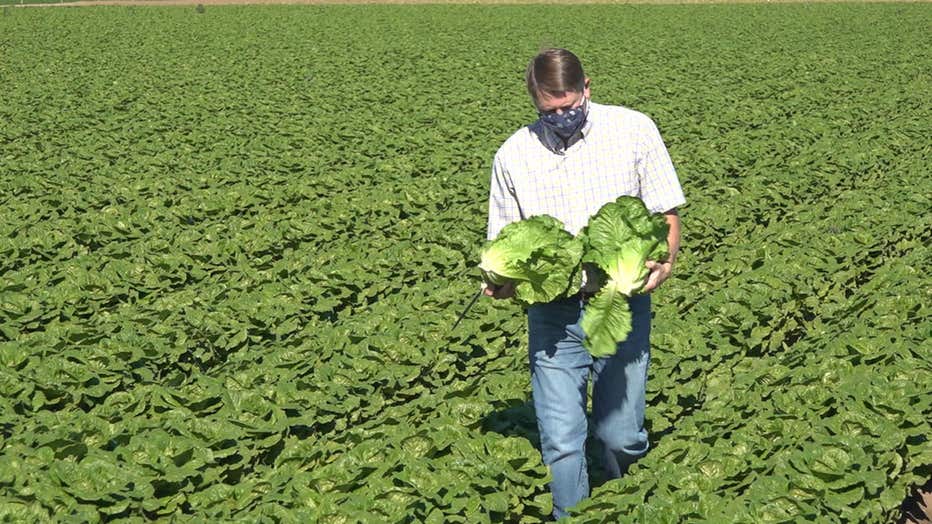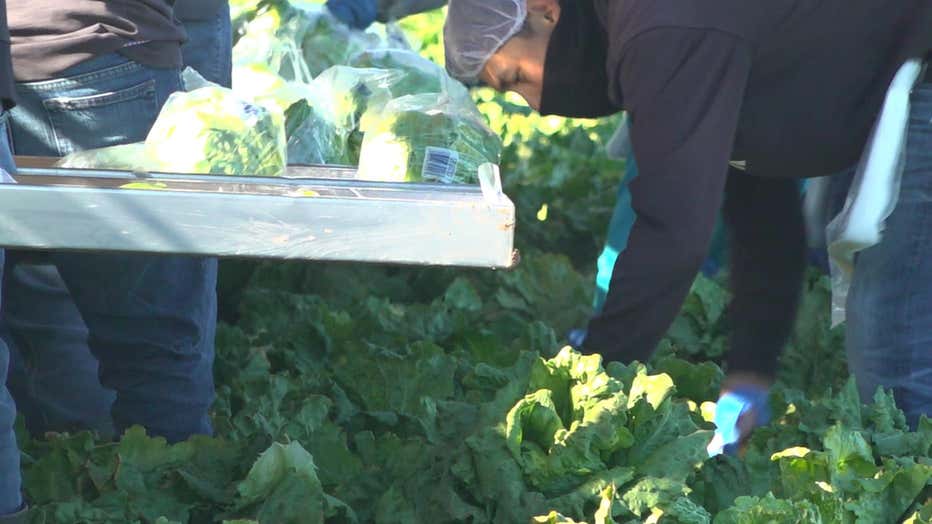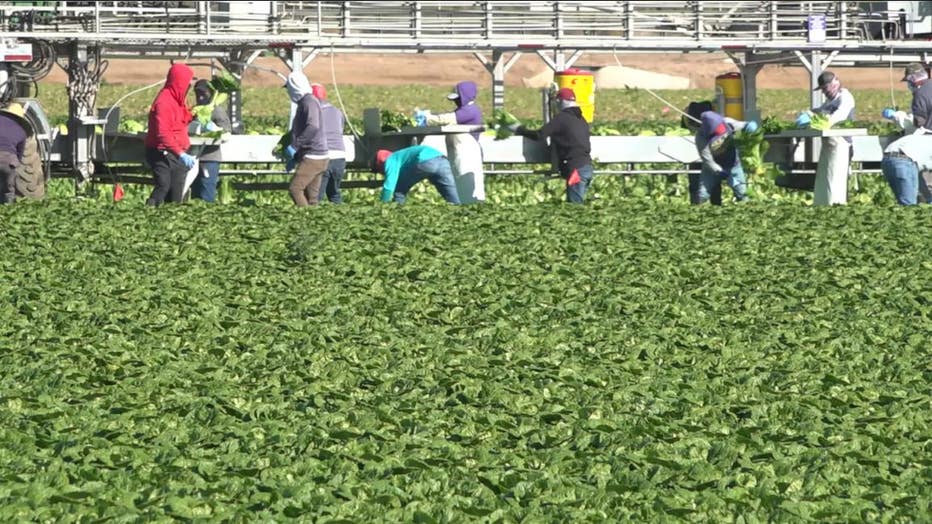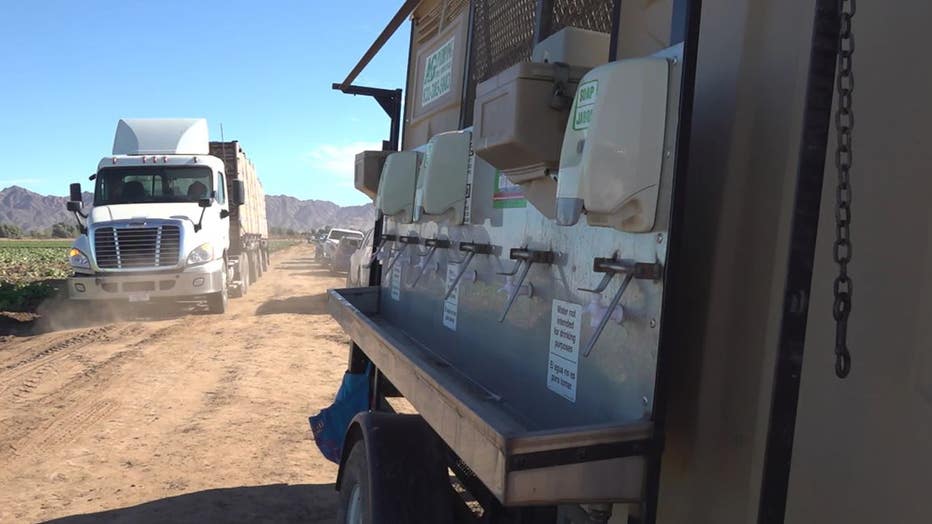Coronavirus pandemic impacts lettuce industry as farmworkers brace for busy season
YUMA, Ariz. - Farmers across Southwestern Arizona are hard at work harvesting much of the country’s lettuce supply during their busiest time of the year.
Yuma County has the ideal growing conditions, with cool nights and warm days. From November to April, they supply about 90% of the United States' and Canada's supply of romaine and iceberg lettuces -- about 2 billion servings. However, this year the coronavirus pandemic is taking its toll on the industry and changing the way farmers do things.
VIDEO: COVID-19 impacts lettuce industry
John Boelts of Desert Premium Farms says the season was just wrapping up when the pandemic hit the U.S. last year -- and when restaurants and schools closed, their sales took a hit.

Farmer John Boelts of Desert Premium Farms grows about 2,000 acres of fresh romaine and iceberg lettuce each season. He says the entire area of Yuma County grows about 100,000 acres in total. (Stephanie Bennett/Fox News)
"There’s no such thing as fast food, it takes us months of preparation, planning to grow these crops," Boelts said.
Last year, he said their farm suffered about a couple hundred thousand dollars in losses from products that weren't harvested. Boelts said because of that, farms around town are planting about 5% to 15% less to prevent food waste.
"The amount of production has shrunk a little bit and we’re trying to size that for what the consumers are ready to consume, so I think we've been able to adjust and so far this season looks like we're on track to harvest most or all of what we're going to produce and that's a good thing, we never want to see food, go to waste," Boelts said.
Trying to get enough workers has also been a challenge. Boelts said about 15,000 migrant farmworkers cross the border into Yuma County daily. He says a small percentage of those are staying home or want to go part-time to limit their risk of catching the virus.

Boelts says about 15,000 migrant workers come into Yuma County daily to work on the nearby farms. (Stephanie Bennett/Fox News)
The U.S.-Mexico borders are still closed because of the pandemic and only essential employees like these farmworkers can cross -- but new social distancing guidelines and extra status checks at the border are causing major delays. Victor Juarez, who works on Boelts’ farm, says some of their employees are waking up as early as midnight just to cross in time.
"The wait time right now they’re averaging around three to four hours… one time they thought it was going to be four hours and it just went up to like six so they got here late, we were calling them like no stay in line we need you guys, we need to get this work done today," said Juarez, a food and workplace safety technician.

Hundreds of workers are busy harvesting lettuce this time of year. From November to April, these farms grow about 90% of the U.S. and Canadas supply of romaine and iceberg lettuce. (Stephanie Bennett/Fox News)
For busy farms like the ones in Yuma, these workers are essential and without them, the lettuce might not get turned in time.
"They’re essential, we need them, they’re hard workers" Juarez said. "It’s hard for a lot of workers who come across the line every day, it takes a toll on you."
Trying to keep their workers safe during a pandemic is a challenge.
Next door, some California farms have already seen COVID-19 outbreaks. Boelts says they planned early last year when the pandemic began to make sure they wouldn’t be next.

Boelts says they started planning for the pandemic early on. They require everyone to wash their hands, always wear masks, and try to stay socially distant whenever possible. They also sanitize high touch areas like tractors. He says they always wore (Stephanie Bennett/Fox News)
"We trained and encourage folks to follow CDC [Centers for Disease Control] recommendations, not just while they were at work, but also when they went to the store while they were home, or with family members that didn't live in their household with them. Most folks were pretty good about that. We've definitely seen less of an impact at our place of work than some other folks have experienced so kudos to my crew for embracing that" Boelts said.
Boelts says everyone is required to wash their hands, wear a mask, and stay socially distant whenever possible.
"Back in March, we couldn't get our hands on disposable masks so we procured some cloth masks and had those made up, gave them to our employees we got extras so that when they went home, they can have one for their spouse, or for themselves," he said.
They also sanitize high-touch areas like tractors before workers swap over. However, he says most workers wore masks before the pandemic to protect themselves against the harsh Arizona sun, and hand-washing stations were also scattered around the farm before the virus.
"Their safety is our number one priority… We couldn't do any of this without all the agricultural workers," he added.
For now, the U.S.-Mexico border will remain closed to non-essential travel until at least Feb. 21, which could continue to delay migrant workers.
Click here for updates on this story from FOXNews.com.

